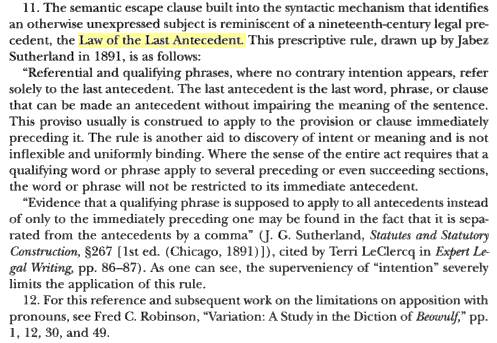August 07, 2006
Lawyers in need of linguistic training
Estelle Hawa sent in a link to an article by Grant Robertson in yesterday's Globe and Mail, "A basic rule of punctuation":
It could be the most costly piece of punctuation in Canada.
A grammatical blunder may force Rogers Communications Inc. to pay an extra $2.13-million to use utility poles in the Maritimes after the placement of a comma in a contract permitted the deal's cancellation.
The controversial comma sent lawyers and telecommunications regulators scrambling for their English textbooks in a bitter 18 month dispute that serves as an expensive reminder of the importance of punctuation.
The problem? The contract said that the 2002 agreement "shall continue in force for a period of five years from the date it is made, and thereafter for successive five year terms, unless and until terminated by one year prior notice in writing by either party." Rogers meant the "unless and until" clause to modify the clause about renewal, but Aliant (managing rights to the utility poles) felt that it should apply to the whole agreement, and proceeded to give the required one-year notice early in 2005. The Canadian Radio-television and Telecommunications Commission (CRTC) agreed with Aliant.
An Aliant spokesperson commented that "This is a classic case of where the placement of a comma has great importance", but it seems to me that punctuation is secondary. Lawyers with a bit of common sense, combined with elementary skill in analyzing ambiguities of structure and interpretation, should have seen the problem coming, and re-worded that part of the contract so as to make it entirely clear who was entitled to cancel it when. Given the importance of such ambiguities of interpretation, in construing laws and judicial orders as well as contracts, I've always been puzzled that lawyers aren't routinely educated in basic practical syntax and semantics. In olden times, lawyers would have acquired (an approximation to) these skills in the course of learning dead languages. These days, I suppose that few of them get any educational help at all in such matters, and have to fall back on their native wit, such as it may be.
Ironically, we've learned a lot over the past century about the analysis of structure and meaning. It's too bad that lawyers and their clients so rarely get the benefit of that knowledge.
Alas, I suppose that $2.13 million (Canadian) is a drop in the financial bucket these days -- easily lost in the round-off error on the lawyers' bills for companies like Rogers, though still embarrassing for the careless contract drafters.
[Update -- Margaret Marks found the decision. The relevant portion reads:
The Commission is of the view that the wording in section 8.1 of the SSA is clear and unambiguous. The Commission notes that based on the rules of punctuation, the comma placed before the phrase "unless and until terminated by one year prior notice in writing by either party" means that that phrase qualifies both the phrases "[the SSA] shall be effective from the date it is made and shall continue in force for a period of five (5) years from the date it is made" and the phrase "and thereafter for successive five (5) year terms".
]
[Update -- Mary Blockley pointed me to a relevant passage in her book "Aspects of Old English Poetic Syntax: Where Clauses Begin" (2001):
The Canadian regulators were apparently unimpressed by the "superveniency of intention". ]
[Another update -- Heidi Harley at Heideas has a extended discussion of the linguistic issues. ]
Posted by Mark Liberman at August 7, 2006 12:37 PM